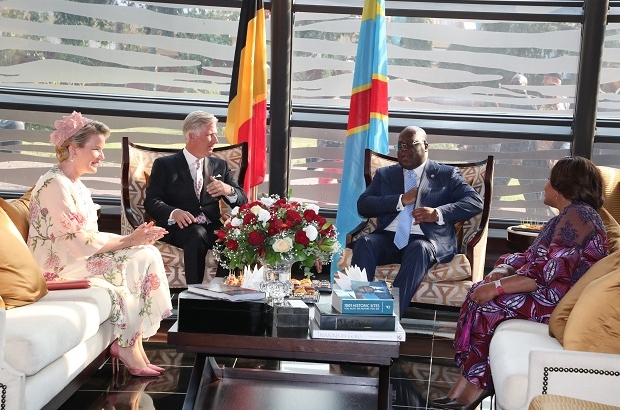- Daily & Weekly newsletters
- Buy & download The Bulletin
- Comment on our articles
Belgian King and Queen visit Congo in first royal trip since 2010
Twelve years after Albert II and Paola visited the Democratic Republic of the Congo for the 50th anniversary of its independence, Belgium’s current King Philippe and Queen Mathilde are spending one week in the country.
Since Belgium’s infamously brutal colonisation by Leopold II, almost all of the country’s monarchs have visited the central African country at some point during their reign.
But King Philippe’s visit comes at a time when relations between the DRC and its former coloniser are particularly strained.
While the current king has been on the throne since 2013, RTFB reports that he has previously not participated in any economic missions to the DRC due to beleaguered bilateral relations between the two countries in recent years.
This present royal visit takes place not long after a formal inquiry was established in 2021 into Belgium’s colonial past, including it’s share of responsibility in the assassination of the independent Congo’s first prime minister Patrice Lumumba. That inquiry has yet to formally conclude, but initial reports have already strongly condemned Belgium for the atrocities committed in the Congo throughout this period.
Owning up to Belgium’s colonial past
Belgium has made some small efforts to atone for its crimes in the region, largely through the removal or reorganisation of public spaces, including monuments linked to its colonial past. These include the recent renaming of the Leopold II Tunnel.
Philippe himself has also chimed in on the matter, expressing his “deepest regrets” for the “wounds, suffering and humiliation” caused by Belgium during the colonial period in a letter addressed to Congo’s president Felix Tshisekedi.
The letter made reference to “acts of violence and cruelty” during the first period of colonisation (1885-1908) when the Congo was the personal property of King Leopold II, his great-great uncle.
Philippe also said he deeply regretted “these wounds of the past whose pain is today revived by the discriminations still present in our societies,” which marked the first time that a Belgian monarch acknowledged the wrongs caused by Belgium.
Although the letter did not constitute a formal apology, “he went much further than any of his predecessors,” said historian Vincent Dujardin of KU Leuven.
“It is true that King Albert I, as a prince, had very critical words about the situation in the independent state of Congo or in the Belgian Congo; he often asked the Belgian government to do much more for the welfare of the local people, but it was in a private correspondence to ministers,” Dujardin explained.
“Leopold III also had some strong words about the colony before the senate, denouncing a 'system of capitalist exploitation with local populations reduced to mere tools of production', but he was only a prince then.”
While King Baudouin, who was on the throne between 1951 and 1993, also spoke harshly of Belgium’s actions in the Congo, he did so largely in private while presenting the region as “a model colony” in public speeches.
King Philippe is expected to reiterate during a speech at one point in the visit the regrets he expressed in the letter to the Congolese president in the summer of 2020.
Agenda includes visits to important social and economic sites
The trip boasts a packed agenda. It includes a visit to a museum where the Belgian delegation will hand over a large African mask from the collections of Tervuren’s AfricaMuseum. It will be loaned to the Congo as a form of restitution. Belgium has proven to be a hotspot for looted African art, and so the museum exchange is viewed as an important first step in rectifying its role in the trafficking of stolen art.
Other stops will highlight Congolese actors in sustainability and women’s rights, along with a visit to the National Institute of Biomedical Research in Kinshasa, a leading institute specialising in the treatment of Ebola. The delegation will also visit the Belgian School, which enrols 624 students in French-language education.
The royal visit was originally scheduled for 2019 at the invitation of the President of the Democratic Republic of Congo Felix Tshisekedi, but was postponed multiple times due to the pandemic.
Joining the King and Queen for part of the trip are prime minister Alexander De Croo, the minister of development cooperation Meryame Kitir and the secretary of state for recovery and strategic Investments Thomas Dermine, among others.
The Belgian delegation will visit Kinshasa, Lubumbashi and Bukavu.
Photo: Queen Mathilde, King Philippe, DRC president Felix Tshisekedi and DRC first lady Denise Nyakeru at the official welcome at Kinshasa International Airport © Belga/Nicolas Maeterlinck



















